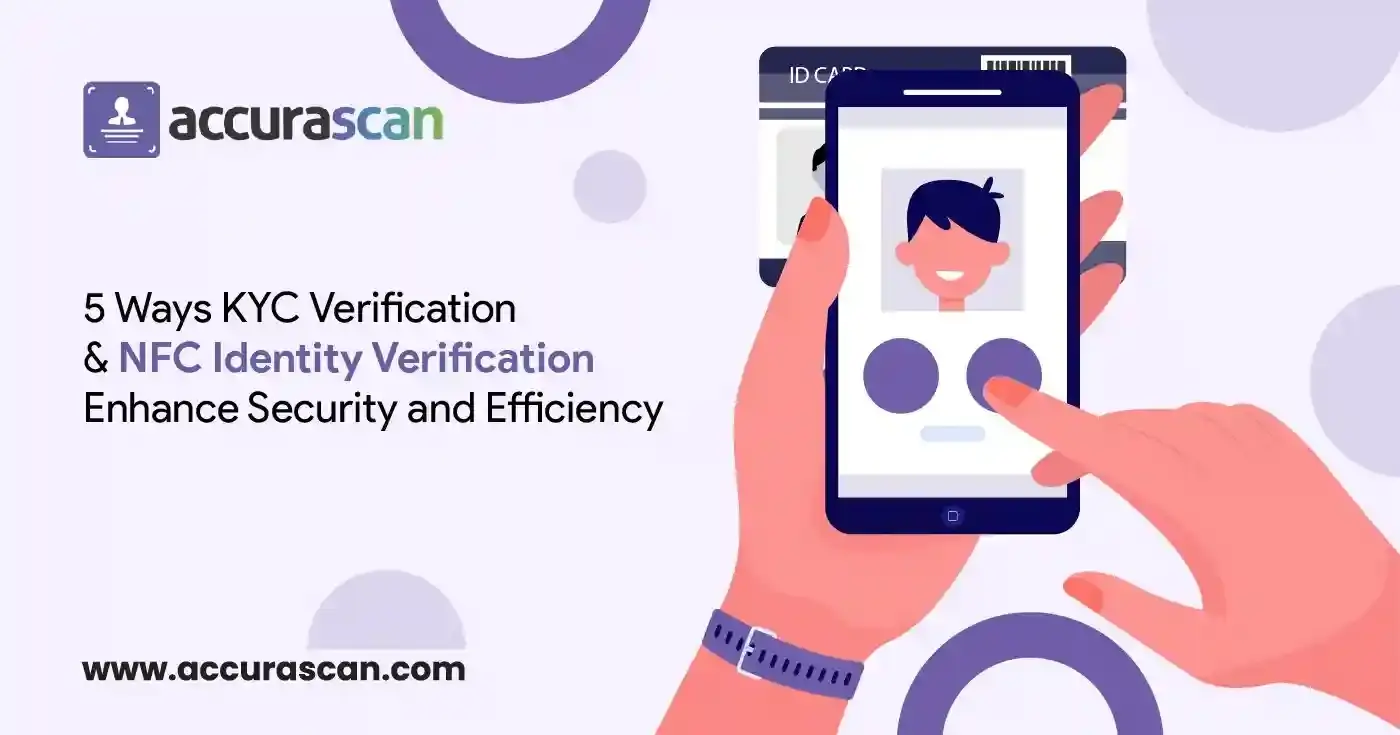Nowadays, digital transactions and interactions take down domination, so security and efficiency are the most critical things. Under the imposed KYC Verification Service, the purpose is to verify customer identity, whereas the NFC Identity Verification provides superior authentication through contactless communication. In this post, we will discuss the ways to enhance security and efficiency by bringing these components together.
What is KYC? Explain in detail.
The regulatory feature required by financial institutions to identify customers or users is KYC or Know Your Customer. Prevention of financial crimes such as money laundering, exposing terrorists, fraud, and identity theft is the main objective of KYC (know your customer). KYC Verification Service concerns the provision of various types of details about the clients, such as personal information, identity documentation, and financial information.
- Customer Identification: The first step of KYC is about ascertaining the following client brief information such as his name, date of birth, current and permanent address, and telephone contact details. The case is the data picked for initiating account opening and afterward for authentication.
- Identity Verification: If the business manages to identify the first thing with the customer, then they can rely on the same to verify the identity of a particular customer from a relatable and trustworthy source. Usually, they emphasize some documents like passports, driver’s licenses, or national IDs to prove their identity.
- Risk Assessment: Along with identity verification, businesses must evaluate whether a transaction is risky and thus needs additional due diligence. This includes checking factors like customer’s own financial status, their transaction history, possible fraud indications, and so forth. Classifying customers into groups of higher and lower risk allows companies to implement measures of risk management appropriate to each one of them and allocate resources based on the risk profile.
- Ongoing Monitoring: KYC is not a one-off exercise as it would require ongoing monitoring of customer accounts and operations that are standard but treat suspicious transactions as unusual. Continuous monitoring facilitates assuring active protection against new risks that emerge and maintaining obligations with regulatory needs.
- Compliance Documentation: As businesses undertake the ID verification, they need to gather all records of customers’ information, including passports, driver’s licenses, utility bills, or any other documents that have customers’ names along with details of their transactions. The documents are implied to make them subject to internal control and audit by regulatory agencies.
What is NFC?
NFC is implemented for the radio interface in the near field range, where devices are capable of exchanging information. Distal magnetic induction in the range of a few centimeters operating in receive mode and never in charge mode allows only the data transfer when the devices are close.
- Communication Range and Frequency: When the NFC communication range is considered to be very short with only a few centimeters, security and data privacy increase as the devices demand physical proximity to each other in communicating. This proximity communication technology is capable of performing near-field communication features, which it does not have in common with wireless technologies such as Bluetooth or WiFi, which have longer distance communication ability.
- Security Features: NFC Identity Verification provides a number of protection features that directly affect the security while unauthorized access is prevented. These include:
- Encryption: NFC codes can be encrypted so that the information that flows between devices can not be stolen at any stage. Aside from RSA, there is a family of algorithms that are categorized as AES, and the widely accepted ones include the Advanced Encryption Standard (AES).
- Authentication: NFC Identity Verification procedures can be introduced to verify that the devices are authored with each other before point-to-point data transfer.
- Secure Element: An application component like an NFC-enabled device may include a secure element designed to safeguard sensitive data, such as cryptographic keys or payment credentials, because of the presence of the dedicated hardware component.
Applications of NFC:
- Contactless Payments: NFC-enabled smartphones and connected cards make it secure for users to use the most popular means of making payments by merely tapping on the connected terminals.
- Access Control: NFC-enabled access control systems are common in offices, buildings, and public transportation. Authorized people can get in with a card or device, and they swipe at an NFC-enabled control point.
- Ticketing and Transportation: NFC technology is an underlying element in mobile ticketing in city transportation systems, which provides an opportunity of cashless payment for local residents to have NFC-enabled smart cards or smartphones with them.
- Healthcare and Identification: Highly NFC devices can be used for several applications, such as patient identification by means of smart chips or milled cards, monitoring medical devices, and managing medications.
5 Ways in Which KYC & NFC Identity Verification Enhance Security
- Comprehensive Identity Authentication:
This approval can be interpreted as the first safety measure to prevent identity theft, deception, and financial crimes. Scrutinizing the time-tested client’s data against credible sources would help the business to prove the identity behind the real persons. NFC technology plays a central role in aiding this process by providing an immediate walk-through of NFC-embedded identification papers like passports and ID cards.
- Enhanced Data Security:
Data breaches and the perpetration of identity theft are the two biggest threats where both individuals and businesses can be victims. Implementing KYC Verification Service involves the acquisition of and possession of personal and sensitive information, which in turn places data security at the front and center. NFC tag identity verification ensures the safety and secure transmission of identity data since it encrypts the data transmitted between the NFC-enabled devices.
- Streamlined Customer Onboarding:
Nowadays, the digital business world offers frictionless user experiences as a key to customer satisfaction and remains on the platform. Some clients come to the conclusion that the KYC Verification Service requires too much time and effort, which may be used for more convenient banking options elsewhere.
- Compliance with Regulatory Requirements:
Regulators around the globe raise KYC standards to ensure that the laundering and financing of terrorism, as well as other criminal activities, are declined and minimized. Non-compliance may result in harsh penalties, damaged reputation, and professional and legal liability issues for companies. NFC technology enables companies to ensure quick and efficient regulatory compliance. No third party can intervene or modify NFC documents because they are tamper-resistant and use secure data transmission protocols.
- Cost Reduction and Operational Efficiency:
NFC identity verification is an automated KYC process that eliminates unnecessary activities and makes the system operate much faster. Such improvement will result in more cost savings and better efficiency on the operation side. With minimal human effort and waiting for paper-based documentation, organizations can save resources and focus on their core business competencies, increasing productivity and market competitiveness.
The Takeaway:
With a world moving toward greater digitization and more interactive technologies, using internet-based verification and NFC identifiers in one system presents a good way to solve the need for security and efficiency. Leveraging NFC technology to enhance KYC procedures and security would help the business build a strong posture, allow customers to have a better experience, and, at the same time, enable the companies to remain compliant with the required regulatory processes.


























